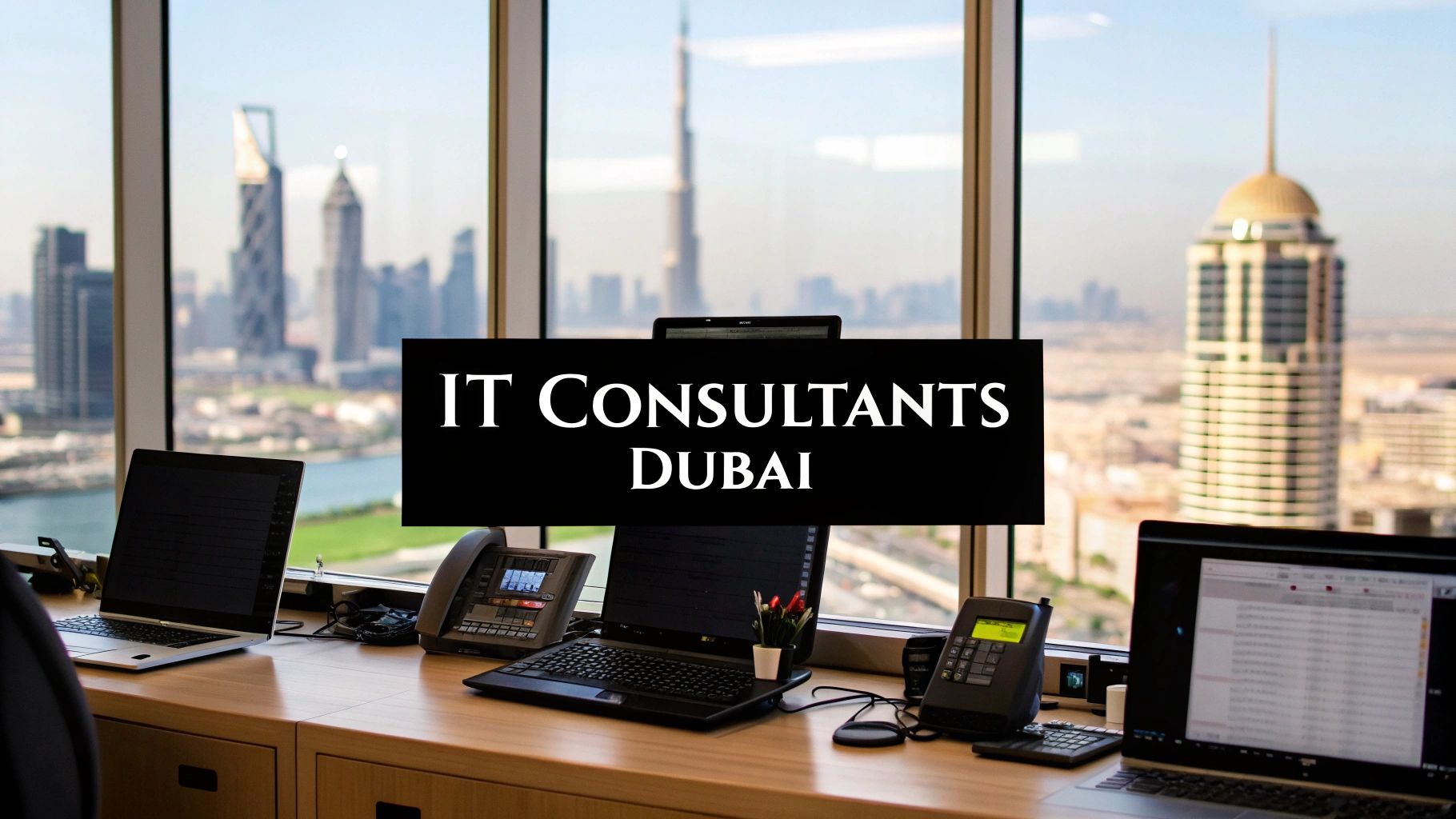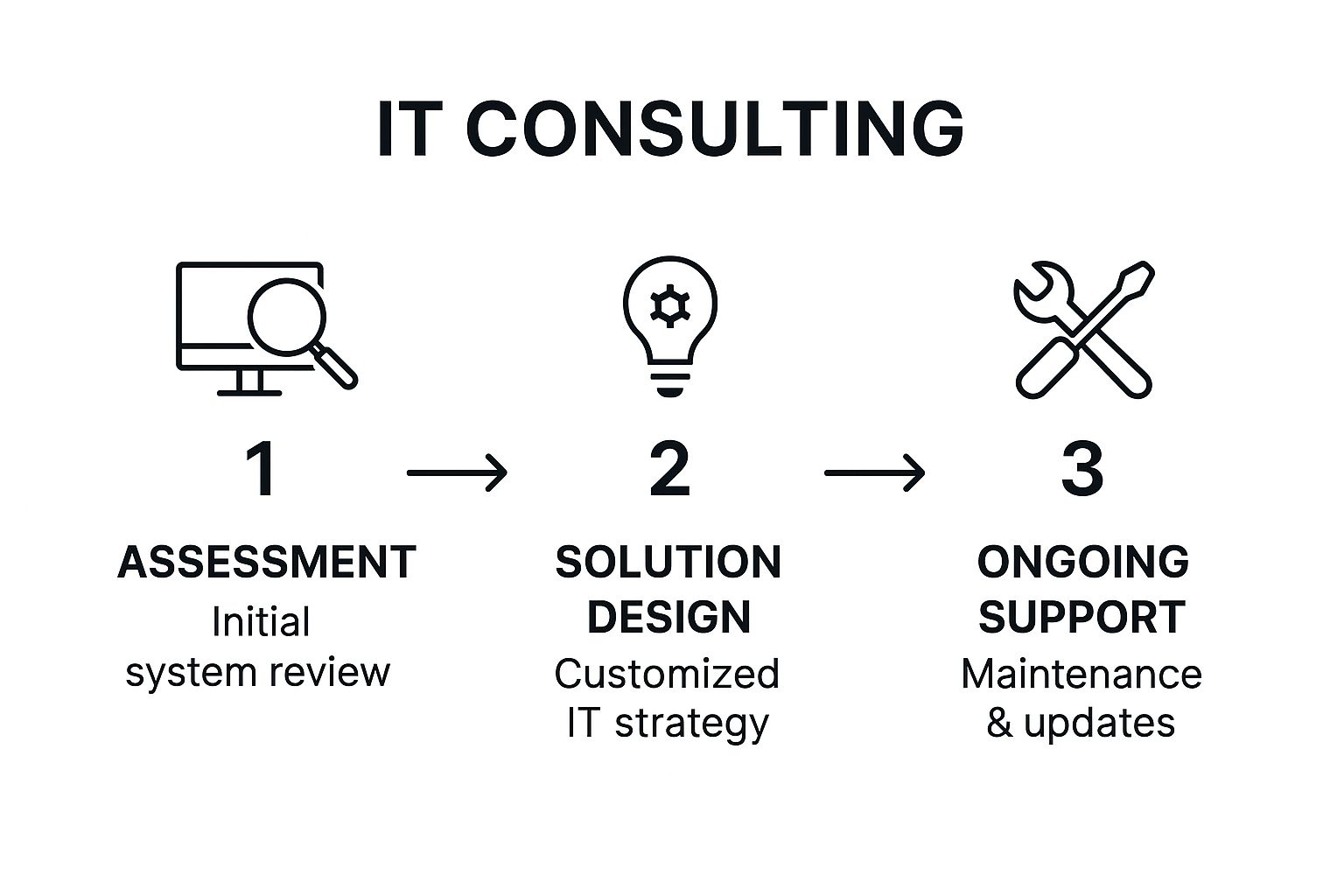
When you're looking for an IT consultant in Dubai, you're not just hiring a tech expert. You're bringing on a partner who gets the city's unique, breakneck-speed technology ecosystem. The options are vast, from global giants to highly focused local agencies, offering everything from cybersecurity hardening to cloud migration and AI strategy—all influenced by ambitious government initiatives like Smart Dubai.
Getting to Grips with Dubai's Tech Consulting Scene

Before you even start your search, it pays to understand what makes Dubai’s tech consulting market tick. This isn't just another global business hub; it's a city designed for technological ambition from the ground up. Government-led directives are the powerful current every business has to navigate, shaping everything from data governance rules to how you run your daily operations.
This forward-thinking environment has created a seriously competitive and diverse consulting landscape. You’ll see the big multinational firms right alongside nimble, specialised local players, all vying for projects. This variety is a direct result of the UAE’s strategic pivot away from oil dependence and toward a knowledge-based economy.
What’s Driving the Market?
A few key factors make Dubai’s tech scene so energetic. If you’re a business hunting for an IT partner, getting a handle on these drivers can help you align your project with the region's broader goals, which can open up some incredible opportunities.
Here’s what’s really fuelling the demand:
- Government Initiatives: Programmes like Smart Dubai and the National AI Strategy 2031 are more than just policy papers. They are active frameworks pushing both public and private sectors to embrace new technologies.
- Sector-Specific Demands: Key industries like fintech, healthcare, logistics, and tourism are digitising at a blistering pace. This creates a need for very specific IT expertise in areas like secure payment gateways, electronic health records, and supply chain automation.
- Economic Diversification: As the UAE pushes forward with its economic diversification strategy, businesses in every sector feel the pressure to modernise. This keeps the demand for expert consulting services consistently high.
This ecosystem is expanding fast. Dubai's IT consulting market is a huge slice of a broader $3.8 billion consulting industry that’s growing at around 11–13% annually, spurred on by the UAE's Vision 2030 framework.
And consider this: with over 70% of UAE businesses actively prioritising new technologies like AI and blockchain, the need for expert guidance is intense. This boom is also reflected in a 60% surge in specialised consulting roles, highlighting a highly competitive market of over 300 firms. You can find more details on the regional consulting market on thethinksters.com.
Global Players vs. Local Specialists
One of the first forks in the road you'll encounter is choosing between a massive, multinational consulting firm and a smaller, local specialist. They each bring something different to the table, and the right choice really boils down to your specific needs, budget, and the scope of your project.
A global firm often comes with a wealth of international experience and enormous resources, making them a natural fit for large-scale enterprise projects. They tend to use standardised methodologies that can offer a sense of security for complex, multi-year transformations.
On the other hand, a local specialist offers deep, on-the-ground knowledge of the regional business culture and regulatory environment. They are typically more agile, providing personalised service and direct access to senior experts. For many small and medium-sized businesses, a local partner often translates to more focused attention and better value for money.
Key Takeaway: Your goal isn't just to find any IT consultant. It's to find a partner whose expertise, scale, and working style are a perfect match for your business objectives and the specific challenges of operating in Dubai's dynamic market.
Defining What Your Business Truly Needs

Before you even start looking for the right IT consultants in Dubai, the most critical work happens inside your own walls. Jumping into calls without a clear objective is like setting sail without a map—you'll burn through time and money, only to end up somewhere you never intended to go. The best consulting partnerships I've seen always start with a solid foundation of self-assessment.
This isn't just about turning vague frustrations like "our systems are slow" into a project scope. It's about creating a clear brief that helps you communicate what you need and, just as importantly, empowers potential consultants to propose genuinely useful solutions right from the start.
Conducting an Internal Needs Assessment
First things first, you need to pinpoint the exact problems you're trying to solve. This doesn't have to be a massive, formal audit. It can start simply by asking the right questions and, more importantly, listening to the people on the front lines. Get feedback from different departments to build a complete picture of your technological pain points.
What’s the operational bottleneck that’s costing your team hours every week? Where are manual processes creating unnecessary risks? Are there specific compliance requirements, maybe from an authority like SIRA, that your current setup is struggling with?
Think about these areas to get started:
- Operational Gaps: Look for repetitive tasks ripe for automation. For instance, is your sales team still manually entering lead data that could be piped in directly from your website?
- Security Vulnerabilities: Where does your data feel most exposed? It could be anything from unpatched software to a simple lack of multi-factor authentication on critical systems.
- Growth Barriers: What’s the one piece of tech holding you back from scaling? I once worked with a local retailer whose e-commerce platform simply couldn't handle the inventory and traffic needed to expand across the UAE. That was their critical barrier.
This initial digging is about collecting evidence. You're building a solid business case for why you need outside help, backed up by real examples from within your own organisation.
Assembling Your Internal Team
Once you have a better handle on the problem, you need to bring the right people to the table. A technology project is never just an IT project; it ripples across finance, operations, marketing, and customer service. Involving these leaders early on ensures the solution works for the entire business, not just one department's wish list.
For example, if a financial services firm in DIFC needs to overhaul its cybersecurity, the project team can't just be the IT manager. The Chief Financial Officer, the head of compliance, and even the head of client relations all need a seat at that table to help define what success actually looks like.
A project’s success is often determined before the first consultant is even contacted. Getting buy-in and diverse perspectives from your internal team ensures the final solution is practical, adopted, and delivers value across the board.
This collaborative approach does wonders to prevent scope creep down the line and builds momentum internally. When everyone feels like they've had their say, they become champions for the change you're trying to make.
Setting Measurable Success Metrics
With the problem defined and your team in place, the final step is to decide what "done" looks like. Vague goals inevitably lead to vague outcomes. You need to nail down clear, quantifiable Key Performance Indicators (KPIs) that will actually measure the project's impact.
Don't just say you want to "improve efficiency." Aim to "reduce manual data entry by 20 hours per week." Instead of a goal to "enhance security," make it "achieve 100% compliance with a specific security framework and cut incident response time by 50%."
Here’s a simple way to frame this:
| Business Objective | Vague Goal | Specific KPI |
|---|---|---|
| Increase Online Sales | "Improve our e-commerce site" | "Increase online conversion rate by 15% within six months" |
| Enhance Cybersecurity | "Make our network more secure" | "Implement a zero-trust framework and pass a third-party penetration test" |
| Improve Team Output | "Give our team better tools" | "Reduce time spent on administrative tasks by 30% through software automation" |
Having these precise metrics completely changes the conversation with the IT consultants Dubai has to offer. They can look at your KPIs and explain exactly how their plan will get you there. It shifts the discussion from a generic sales pitch to a strategic talk about real business results. Now, with this clear brief in hand, you’re truly ready to start searching for the right partner.
Finding and Shortlisting the Right IT Consultants in Dubai

Alright, you've got your project brief sorted. Now comes the real work: finding the right people for the job. Simply Googling "IT consultants in Dubai" will throw thousands of results at you, but that's not a strategy. Dubai’s tech scene is vibrant and crowded, so you need a smarter way to find the real experts among the masses.
Start by tapping into professional networks. I’m not just talking about your immediate contacts, but platforms like LinkedIn, which are incredibly useful here. You can filter by expertise, see who is connected to whom, and, most importantly, read genuine recommendations from UAE-based clients.
Don't forget to check out industry-specific directories and business associations. Groups like the Dubai Chamber of Commerce are a fantastic resource. Their member lists often feature established, reputable firms that have already been vetted to some extent, giving you a solid starting point.
Think Beyond a Simple Search
A top spot on Google doesn't always mean top-tier talent; it often just means a hefty marketing budget. You need to dig a little deeper.
Look for consultants who are actively involved in the local tech community. Are they speaking at seminars? Are they present at tech meetups? It's one thing to have a polished website, but it's another thing entirely to hear an expert articulate solutions to problems you're facing right now. That direct interaction can tell you more than any brochure ever will.
Casting a Wide Net: Your Initial Longlist
The first goal is to build a "longlist" of potential partners—think 10 to 15 firms. At this point, you're not getting into the weeds with proposals. You're just gathering all the promising names you can find.
Here are a few places I've found great candidates:
- LinkedIn Groups: Search for groups focused on Dubai tech, business, or your specific industry.
- Peer Referrals: Ask people you trust in your network who they’ve used. This is often the best source.
- Industry Events: Pay close attention to the speakers and sponsors at local tech events and webinars.
- Business Hub Directories: Check the partner lists for communities like Dubai Internet City (DIC) or Dubai Silicon Oasis (DSO).
This approach helps you build a list grounded in actual reputation and proven expertise, not just slick marketing.
Expert Tip: When you get a referral, ask probing questions. Don't just ask, "Were they good?" Instead, try: "How did they handle scope creep?" or "What was their communication like when a deadline was at risk?" The answers to those questions are pure gold.
From Longlist to Shortlist: The Final Cut
Now, let's get that longlist down to a manageable shortlist of three to five serious contenders. This is where that project brief you worked on becomes your most critical tool. Use it as a filter.
Scrutinise each firm's website and marketing materials. You’re looking for proof, not just promises.
Do their case studies involve businesses like yours? Are they talking about solving the exact problems you’ve outlined in your brief? If a firm only showcases massive enterprise projects and you're a mid-sized company, they might not be the right fit.
To keep things objective, it helps to create a simple checklist to vet each candidate against the same criteria. This prevents you from being swayed by a flashy presentation and helps you make a truly informed choice.
IT Consultant Vetting Checklist
Use this quick-reference table to systematically evaluate and compare potential IT consulting firms as you narrow down your longlist.
| Evaluation Criteria | What to Look For | Red Flags |
|---|---|---|
| Local Market Experience | Case studies and testimonials from Dubai or UAE-based clients. | Vague or generic examples with no regional context. |
| Industry Specialisation | Clear evidence of working with companies in your sector (e.g., finance, retail, logistics). | Claims to be an "expert in all industries." |
| Technical Expertise | Specific technologies and platforms listed that align with your project needs. | Buzzword-heavy descriptions with no substance. |
| Team Size & Structure | Information on their team's qualifications and whether work is done in-house. | No mention of the actual team; reliance on freelancers. |
| Client Testimonials | Verifiable reviews on platforms like LinkedIn, Google, or Clutch.co. | No testimonials, or only anonymous quotes on their website. |
A structured approach like this is the key to moving forward with confidence. For more details on what makes a great tech partner, our guide on selecting IT support services in Dubai provides a deeper dive. This consistent evaluation will ensure you're only engaging in serious conversations with the most qualified firms.
The Vetting Process That Reveals the Best Fit
You’ve narrowed down your list. Now comes the critical part—moving past the slick websites and persuasive sales pitches to find the IT consultant that genuinely clicks with your company’s culture and technical needs. Think of this vetting process as your best line of defence against a partnership that looks great on paper but falls flat in reality.
The first few meetings are your opportunity to take control. Forget their rehearsed presentation; your job is to drive the conversation towards specific, evidence-based answers. You need to uncover how they really operate, communicate, and solve problems when things get tough. This is how you see past the marketing spin and meet the actual team you’ll be working alongside.
Questions That Go Beyond Technical Skills
Technical know-how is the price of entry, but it’s only half the story. The best IT consultants in Dubai are also fantastic communicators and strategic partners. Your questions need to dig into these softer, but absolutely essential, skills.
Start by getting into the weeds of their project management style. Ask them straight up:
- How do you manage projects? Listen for methodologies like Agile, Scrum, or Waterfall. If you anticipate your project will need to pivot, a firm rigidly sticking to a Waterfall approach might not be the right fit.
- What can we expect in terms of communication? Will it be weekly reports, daily stand-ups, or simply access to a portal? Getting this clear from the start avoids a world of frustration down the line.
- Tell me about a time a project went sideways. What did you do? This is a golden question. It pulls them out of hypotheticals and into a real-world scenario, revealing their problem-solving skills and sense of accountability.
A good answer will show ownership, proactive communication with the client, and a clear plan to get things back on track. A weak answer will deflect blame onto the client or other outside factors.
Key Insight: A consultant's real value isn't just in knowing the technical fix; it's in their ability to guide you through ambiguity, be upfront when things go wrong, and tailor their approach to your business reality.
The UAE's booming tech sector puts a lot of pressure on consultants to deliver top-tier results. The United Arab Emirates IT services market is on track to hit USD 20.24 billion in 2025, with projections showing it will grow at a CAGR of 13.24% to roughly USD 37.69 billion in the years following. This explosive growth is driven by national digital transformation strategies, cloud adoption mandates, and AI expansion—all of which require consultants to be more than just tech experts. You can find more data on the UAE's thriving IT market at Mordor Intelligence.
The Real-World Challenge Test
One of the most telling things you can do is present candidates with a small, real-world challenge your business is facing right now. This isn't about scoring free advice; it's a practical test to see how they think on their feet.
Frame a problem that’s specific but not overwhelming. For instance: "We're seeing our cloud data storage costs creep up, and we need a way to get them under control without hurting performance."
Their response will speak volumes.
- Do they ask smart, clarifying questions? A great consultant will immediately want to know more about your usage patterns, data types, and business cycles before even thinking about a solution.
- Do they jump to a cookie-cutter answer? A red flag is an immediate "Oh, you should just switch to this service." A true partner will talk you through the trade-offs and various options.
- Do they connect it back to the business? The best answers will tie the technical fix directly to your business goals, whether that's cost savings or better operational efficiency.
This little exercise is a preview of your day-to-day working relationship. It's a powerful way to understand how different service models can tackle these issues, which you can read more about in this article on the future of IT outsourcing and managed support in the UAE.

The image above illustrates the typical journey with an IT consultant, starting with an assessment and strategy phase before moving into ongoing support. It’s a good reminder that a successful partnership is a continuous process, not a one-off project, which is why finding that long-term strategic alignment is so crucial.
The Power of Diligent Reference Checks
Finally, never, ever skip the reference checks. And don't settle for generic questions. Of course, a past client is going to say the project was "a success." You need to dig deeper to understand the reality of the working relationship.
Instead of asking, "Was the project successful?" try these more revealing questions:
- "How did the consultant respond when you needed to make unexpected changes?"
- "Can you describe their communication and reporting on a typical week?"
- "If you could change one thing about how they worked, what would it be?"
- "Did the business value they delivered in the end match what they promised in the proposal?"
The answers you get here will paint a much clearer picture of their reliability, flexibility, and whether they truly deliver on their promises. This is how you pick a partner who is set up for success, not just for a sale.
You’ve navigated the interviews, checked the references, and finally found the right IT consultant for your business. It feels like the hard part is over, but don't rush through this final stage. The contract is where your partnership truly begins, and getting it right is crucial. Think of it less as a legal formality and more as the foundational blueprint for a successful relationship.
A solid contract, backed by a detailed Service Level Agreement (SLA), is your best defence against future headaches. It’s about turning all those promising conversations and handshakes into clear, enforceable commitments that protect your business.
What to Look For in the Service Level Agreement (SLA)
The SLA is the operational core of your agreement. It's where you move from broad promises to specific, measurable performance standards. A weak or vague SLA is a recipe for frustration, so you need to make sure yours is airtight.
So, what does a strong SLA actually look like?
- Response and Resolution Times: This is non-negotiable. The SLA must spell out exactly how quickly your consultant will acknowledge an issue versus how long they have to actually fix it. For instance, a critical server outage might demand a 15-minute response time, while a minor software glitch could have a 24-hour resolution window.
- System Uptime Guarantees: If you're relying on them for managed services, you need a firm guarantee. Look for a specific uptime percentage, like 99.9% availability, and be sure the contract details the penalties or service credits you’ll receive if they don't meet it.
- Reporting and Communication: How will you know what’s going on? The SLA should define the communication rhythm. Will you get a monthly performance dashboard, jump on weekly update calls, or have access to a live project management portal?
Getting these details locked down removes any room for interpretation. You'll know precisely the level of service you've paid for, and your consultant will have clear benchmarks to hit. In Dubai's dynamic business world, that kind of clarity is invaluable.
The Make-or-Break Contract Clauses
Beyond the SLA, the main body of the contract has several critical clauses you simply can't afford to skim over. Ignoring the fine print here can lead to serious legal and financial trouble later on. If anything feels unclear, this is the time to bring in your legal counsel.
Make sure your agreement explicitly covers:
- Scope of Work (SoW): This needs to be exhaustive. Every single deliverable, task, and project milestone should be listed. If it isn't written down in the SoW, it isn’t part of the deal.
- Payment Terms: Get specific on the money. Whether it’s a fixed project fee, a time-and-materials arrangement, or a monthly retainer, the terms should be crystal clear. Pin down invoice schedules, payment due dates, and any consequences for late payments.
- Intellectual Property (IP) Rights: This is a big one. Who owns the custom code, software, or unique processes developed during the project? The contract should state unequivocally that all IP created for your business belongs to your business.
- Confidentiality (NDA): A robust non-disclosure agreement is essential. This clause protects your sensitive company data, customer lists, and internal strategies from being exposed.
- Termination Clause: How do you part ways if things don't work out? This section should outline the exact conditions under which either party can end the contract, including required notice periods and how final payments will be handled.
Expert Tip: Don't be afraid to push back and negotiate. A contract is a two-way street. If a term feels one-sided or unclear, bring it up. A consultant who sees this as a long-term partnership will be more than willing to work with you to draft an agreement that’s fair for everyone.
The demand for these services is only getting stronger. The UAE's Information and Communications Technology (ICT) market, which is the engine driving the need for IT consultants in Dubai, was valued at an estimated USD 38.21 billion in 2024. Experts project it will grow at a staggering 13.40% each year, rocketing to a market value of USD 134.37 billion by 2034, all thanks to nationwide digitalisation initiatives and massive tech investments. You can read more about the UAE's ICT market growth at expertmarketresearch.com.
Ultimately, a well-crafted contract builds a foundation of trust. It aligns expectations from day one and turns a potential partnership into a productive, lasting, and successful one. To get a better sense of the entire selection process, take a look at our full guide on choosing the right it consultants dubai.
Frequently Asked Questions
Hiring an IT partner is a big decision, and it’s natural to have questions. Let's tackle some of the most common ones that come up when businesses are looking for the right IT consultants in Dubai.
What Do IT Consultants in Dubai Usually Charge?
There's no single answer to this, as pricing models are designed to fit different kinds of projects. You'll typically come across three main structures.
-
Fixed-Price: This is exactly what it sounds like. You agree on one total cost for a project with a clearly defined scope and endpoint, like a website build or a specific software rollout. It’s predictable and great for budgeting.
-
Time and Materials: Billed by the hour or day, this model gives you flexibility. It's the go-to for projects where the scope might evolve, such as ongoing IT support or a complex digital transformation where you uncover new needs along the way.
-
Retainer: Think of this as having an expert on call. You pay a set monthly fee for continuous access to strategic advice or a certain block of hours. This works well for businesses that need consistent, high-level guidance without hiring a full-time executive.
You’ll see hourly rates ranging from a few hundred dirhams for a freelance consultant to much higher figures for a top-tier firm. The key is to get detailed proposals and look beyond the price tag to the value and experience you're getting.
Is Local UAE Market Experience Really That Important?
In a word, yes. It's not just a nice-to-have; it's often the difference between success and a costly misstep. A consultant who truly understands the Dubai and wider UAE business culture brings a level of insight that technical skills alone can't provide.
They’ll know the ins and outs of local regulations like the UAE Data Protection Law, which is non-negotiable for compliance. This knowledge alone can save you from major headaches and potential fines.
Beyond compliance, someone with local roots has a network. They know the right regional vendors and service providers, which can smooth out your project timeline and sometimes even lead to better deals. For anything involving e-commerce localisation, regulatory hurdles, or government digital initiatives, this local expertise is invaluable.
Should We Go with a Big Global Firm or a Niche Local One?
This really boils down to your project's size, your budget, and what you're trying to achieve. Both have their strengths.
A massive global firm—think the "Big Four"—has a deep bench, vast resources, and a worldwide perspective. They’re a solid choice for huge, complex enterprise projects that demand a lot of manpower and established processes. The trade-off? They often come with a higher price tag and can be less nimble.
A specialised local firm, on the other hand, usually offers deep, focused expertise. Need a hand with FinTech cybersecurity or implementing AI in a retail setting? A local specialist has likely tackled that exact problem before. They tend to be more agile, you get direct access to senior people, and their local network is often stronger.
For most small to medium-sized businesses, or for projects needing a very specific skillset, a local firm often delivers better value. You get targeted results without paying for the overhead of a global giant.
Ready to partner with a team that combines deep technical expertise with on-the-ground Dubai market knowledge? OMX Solutions L.L.C. offers end-to-end IT services designed to drive your business forward. Visit us at https://omxsolutions.com to learn how we can help you achieve your technology goals.
